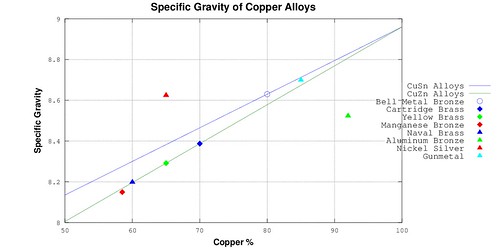
PREV ARTICLE
NEXT ARTICLE
FULL ISSUE
THE SPECIFIC GRAVITY TEST FOR COPPER, BRONZE, AND BRASSWeb site visitor Douglas Dawson submitted these thoughts on our ongoing discussion of the differences between Copper, Bronze, and
Brass (and how to tell). Thanks! -Editor
I'm writing to you as I came across your very interesting pair of articles on copper alloys, specifically: "What's Copper? What's Bronze? What's Brass? What's the Difference?"
"More on the Difference Between Copper, Bronze, and Brass"
I'm coming to this from a non-currency angle, as I have a burgeoning interest in bells and chimes, where the differing alloys of copper can apparently produce different quality sounds. My first thought, which I had before I read the first article, was to use a specific gravity test to tell the difference. Like the author of the first article, I found that it would be ambiguous at best. Even if one could perform the test to better than a percentage point, as the second author points out, the difference between brass and bronze is the alloying metal (zinc or tin, respectively). But because of their differing densities, you could not uniquely distinguish the two alloys.  In order to help me think through the specific gravity test, I made the above chart, which may be of interest to others. There are two solid lines on the chart that show pure bronze (CuSn) and brass (CuZn) alloys specific gravities (vertical axis) as a function of copper percentage (horizontal axis). As you can see, depending on the copper content, you could have the same specific gravity for two different copper percentage brass and bronze alloys. I also included the specific gravity of some other copper alloys shown as a circle for bell metal bronze and diamonds and triangles for various other alloys as defined by Wikipedia. See: http://en.wikipedia.org/wiki/List_of_copper_alloys . The other thing that struck me was this comment : "What we need is a small, inexpensive device which can identify several different metals using a non-destructive method. The jewelry industry has two or three different kinds of hand-held devices for determining whether a diamond is real. We need something like that" I immediately thought of x-ray fluorescence, which I am somewhat familiar with from my day job. It is non-destructive, and more than capable of giving metal compositions for the elements of interest for most metal alloys. I also knew that the components for these systems were produced for commercial purposes. A quick internet search turned up this product which might fit the bill : http://www.olympus-ims.com/en/xrf-xrd/delta-handheld/delta-alloy/ . One limitation of this method is penetration depth of the x-rays. I haven't done a calculation yet, but it would only return an analysis based on the first centimeter at a guess. It also only illuminates a small area of the sample. Perhaps this measurement combined with a specific gravity test would give confidence on the composition of an entire object. I am pursuing the x-ray angle for my own entertainment. Good luck, and have fun! Here's a more complete list of the E-Sylum articles covering this topic from then 'til now.
-Editor
To read the earlier E-Sylum articles, see:
THE BOOK BAZARREWayne Homren, Editor The Numismatic Bibliomania Society is a non-profit organization promoting numismatic literature. See our web site at coinbooks.org. To submit items for publication in The E-Sylum, write to the Editor at this address: whomren@gmail.com To subscribe go to: https://my.binhost.com/lists/listinfo/esylum All Rights Reserved. NBS Home Page Contact the NBS webmaster 
|